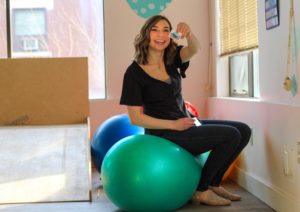Autism Acceptance Month has just recently come to a close. I had thought about making a carefully curated blog post about teaching our Movin’ Mountains community about appropriate language and use of functioning labels, strategies and ways to increase our understanding regarding this marvellous population. However, the internet is already filled with this information and it can get overwhelming!
Therefore, instead of teaching something to you all as I often do in my line of work as an Occupational Therapist, I’d like to share what the autistic community has taught me. I hope to look back on Autism Acceptance Month and CELEBRATE, by sharing just a smidgen of the lessons the Autism and Neurodiverse community has taught me.
So, I present to you…..
Six lessons I’ve learned from Autistic Children as a Neurotypical Occupational
Therapist:
1. Stop and take a look at the world, every part of it!
So many of my kiddos are fiercely perceptive. They have shown me the beauty of the reflection on the wall, the smell of freshly opened bubbles and the feeling of being upside down. If we could all be more perceptive and intrigued by our environments, any place could be a playground, sanctuary or classroom.
2. Feel the big feelings!
Often in life we are told to keep ourselves calm and collected. I vote we let the big feelings out! There is room for
all of the emotions in our day. As an Occupational Therapist, I am often in a position where I help autistic children* work through their big emotions. I am so lucky to be in a position where I am trusted to hold space and ride through these spectrums of feelings with them. All of our emotions are important and play a role in how we work through our day.
3. Laughter is the best medicine.
There have been many times when I had been having a long day at work and required that second cup of coffee, when one of my kiddos lets out the biggest belly laugh. It’s so contagious that I can’t help but follow suit. Laugh it out, it’s good for the soul!
4. Find what you like to do and keep doing it.
So often we are told to find new hobbies, branch out or try something new. While there is validity to this, if you are interested in something, go all in! Get invested in that new video game or learn all the words to nine albums by your favourite artist. Be the expert in the area that you want to be! You just might end up finding your path.
5. Celebrate everything!
No accomplishment it too small. In my job, I often have children tell me “I can’t do that”. Those parents who I’ve worked with will often tell you I’m their child’s biggest cheerleader. Why? Because the small things ARE big things! For example, I help break down big tasks (getting dressed) into component little parts(putting socks on), in order to be able to complete the big task
independently later on. All of the little things added up turn into the big things. If we don’t stop to celebrate them, we just might miss it. Celebrate each step, it is so very important.
6. Communication needs no words.
This one is pretty self-explanatory. You do not need to use words in order to express yourself. You can dance, clap, smile, sign, use a device, hug, point or bounce along with a multitude of other ways to share your thoughts and feelings with the world. How beautiful is it that someone can convey their feelings without needing to say a single thing? In my day-to-day work, the most powerful time someone has told me something was not with words- but with their being.
To all of my autistic kiddos* who have taught me these beautiful lessons, thank you for sharing your world with me. It is a privilege to be a part of yours. I will do my best to be a fierce advocate and ally for you wherever you path may take you.
From your biggest fan,
Kaitlyn Clarke, Occupational Therapist
Movin’ Mountains Therapy Services
*Please note the use of “autistic kiddo/child” and not “child with autism”.
We have learned from autistic adults that the vast majority of this group of individuals prefer to be addressed with their identity first. Thus, the phrase “autistic kiddo” was used in this post. However, each individual has their personal preference, and it is their choice whether they identify as an “autistic person” or a “person with autism, or something else entirely! It is important to listen to the autistic person for their preference in determining identity-first vs. person-first language. You can find more information on this topic here:
https://www.learnplaythrive.com/single-post/stigma





